Effective Intercultural Communication: Analysis of Challenges Faced by BeautyPro in China
VerifiedAdded on 2023/06/07
|16
|1425
|234
AI Summary
The report analyzes the importance of effective intercultural communication and the challenges faced by BeautyPro in China. It discusses the different cultural values, etiquettes, communication styles, and norms of decision making. The report recommends practical solutions to solve the challenges.
Contribute Materials
Your contribution can guide someone’s learning journey. Share your
documents today.
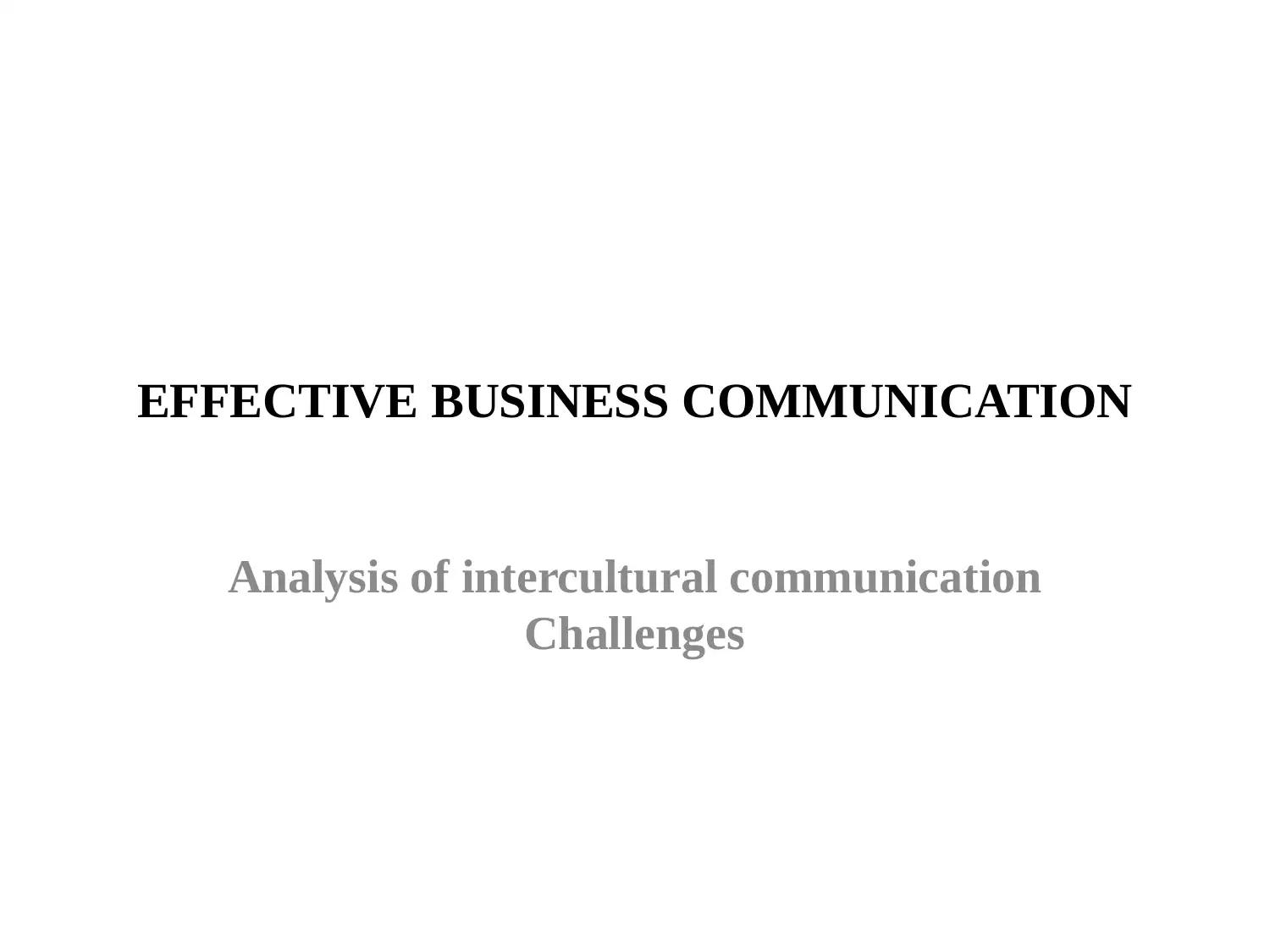
EFFECTIVE BUSINESS COMMUNICATION
Analysis of intercultural communication
Challenges
Analysis of intercultural communication
Challenges
Secure Best Marks with AI Grader
Need help grading? Try our AI Grader for instant feedback on your assignments.
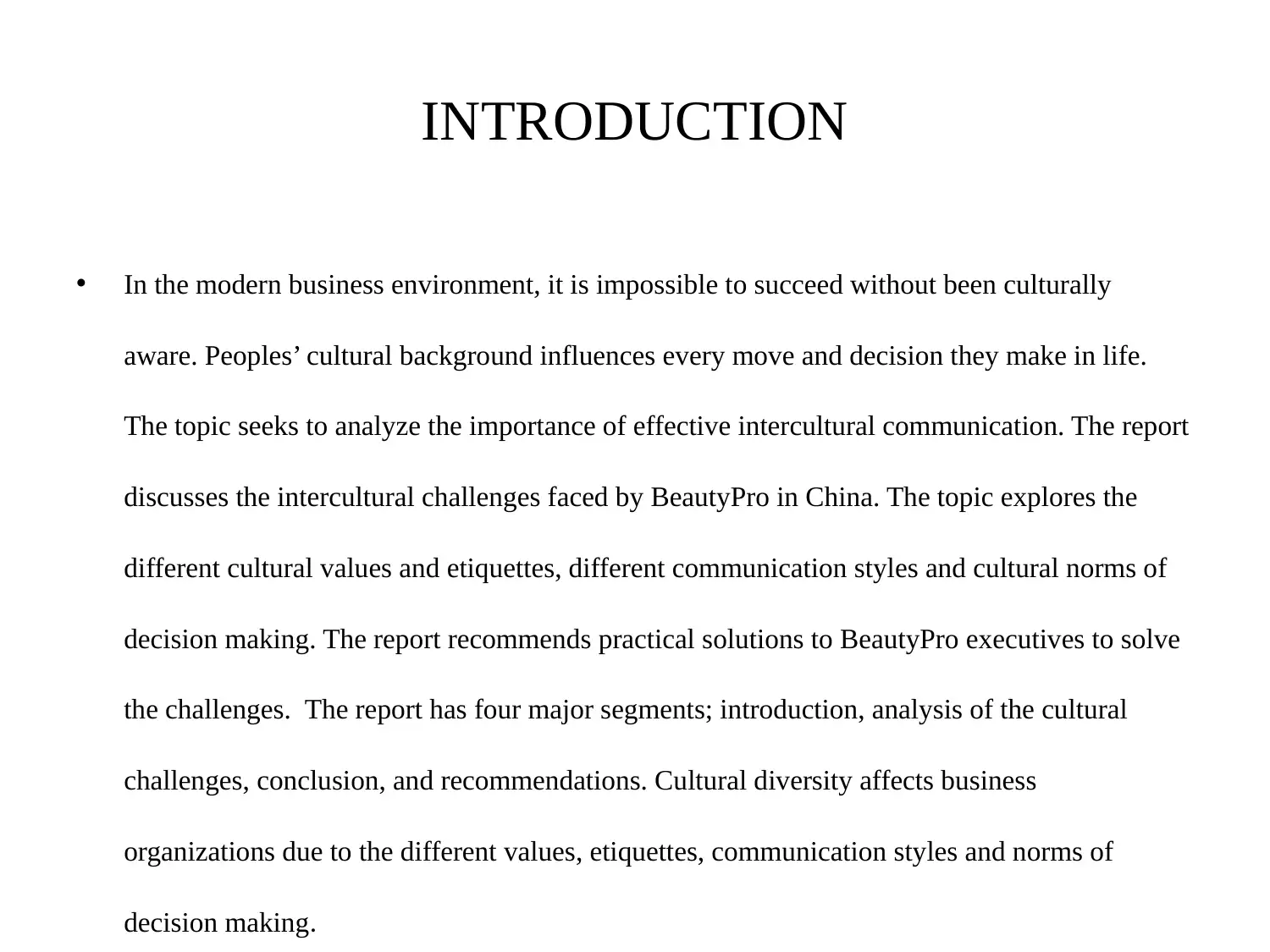
INTRODUCTION
• In the modern business environment, it is impossible to succeed without been culturally
aware. Peoples’ cultural background influences every move and decision they make in life.
The topic seeks to analyze the importance of effective intercultural communication. The report
discusses the intercultural challenges faced by BeautyPro in China. The topic explores the
different cultural values and etiquettes, different communication styles and cultural norms of
decision making. The report recommends practical solutions to BeautyPro executives to solve
the challenges. The report has four major segments; introduction, analysis of the cultural
challenges, conclusion, and recommendations. Cultural diversity affects business
organizations due to the different values, etiquettes, communication styles and norms of
decision making.
• In the modern business environment, it is impossible to succeed without been culturally
aware. Peoples’ cultural background influences every move and decision they make in life.
The topic seeks to analyze the importance of effective intercultural communication. The report
discusses the intercultural challenges faced by BeautyPro in China. The topic explores the
different cultural values and etiquettes, different communication styles and cultural norms of
decision making. The report recommends practical solutions to BeautyPro executives to solve
the challenges. The report has four major segments; introduction, analysis of the cultural
challenges, conclusion, and recommendations. Cultural diversity affects business
organizations due to the different values, etiquettes, communication styles and norms of
decision making.
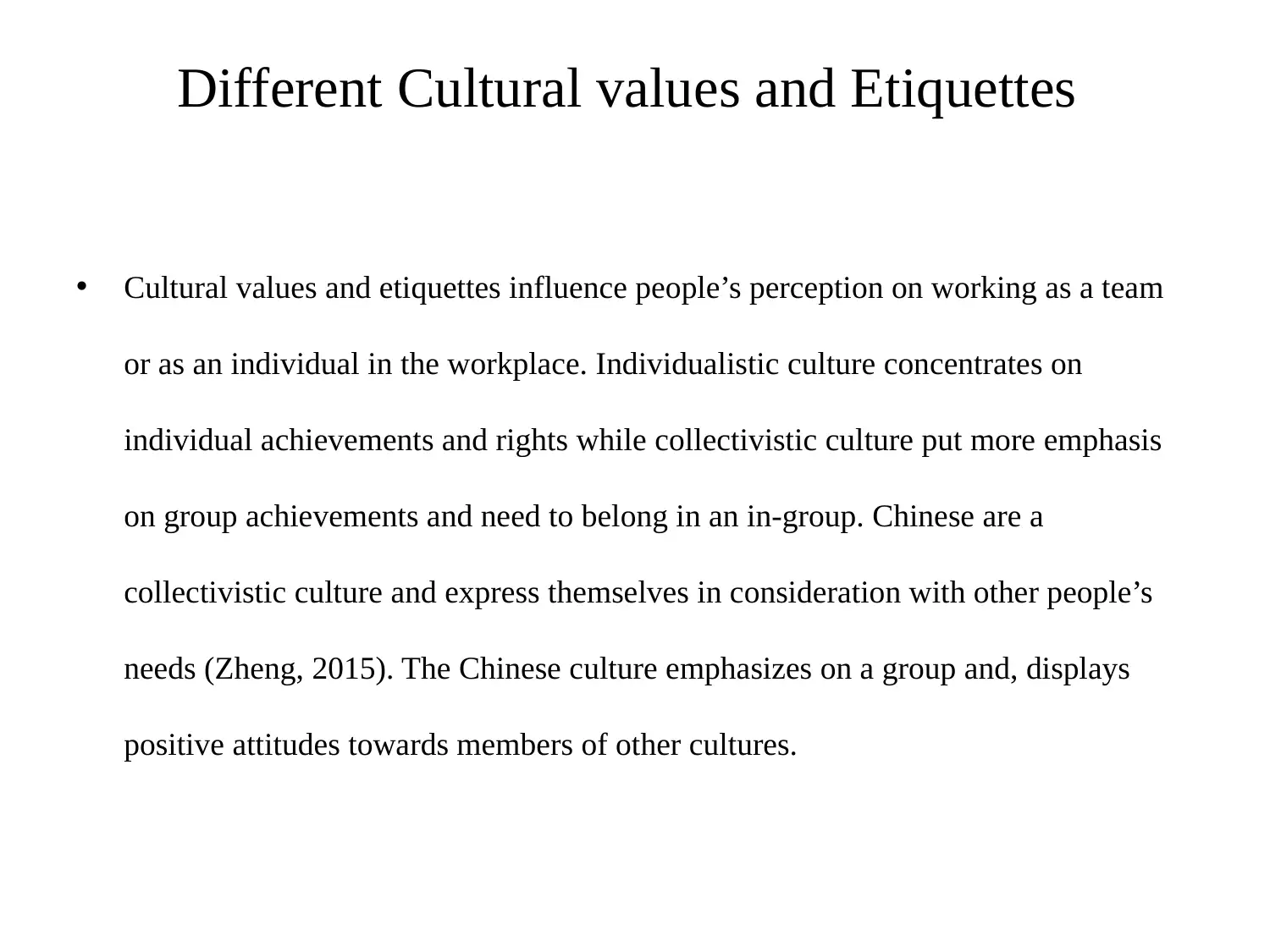
Different Cultural values and Etiquettes
• Cultural values and etiquettes influence people’s perception on working as a team
or as an individual in the workplace. Individualistic culture concentrates on
individual achievements and rights while collectivistic culture put more emphasis
on group achievements and need to belong in an in-group. Chinese are a
collectivistic culture and express themselves in consideration with other people’s
needs (Zheng, 2015). The Chinese culture emphasizes on a group and, displays
positive attitudes towards members of other cultures.
• Cultural values and etiquettes influence people’s perception on working as a team
or as an individual in the workplace. Individualistic culture concentrates on
individual achievements and rights while collectivistic culture put more emphasis
on group achievements and need to belong in an in-group. Chinese are a
collectivistic culture and express themselves in consideration with other people’s
needs (Zheng, 2015). The Chinese culture emphasizes on a group and, displays
positive attitudes towards members of other cultures.
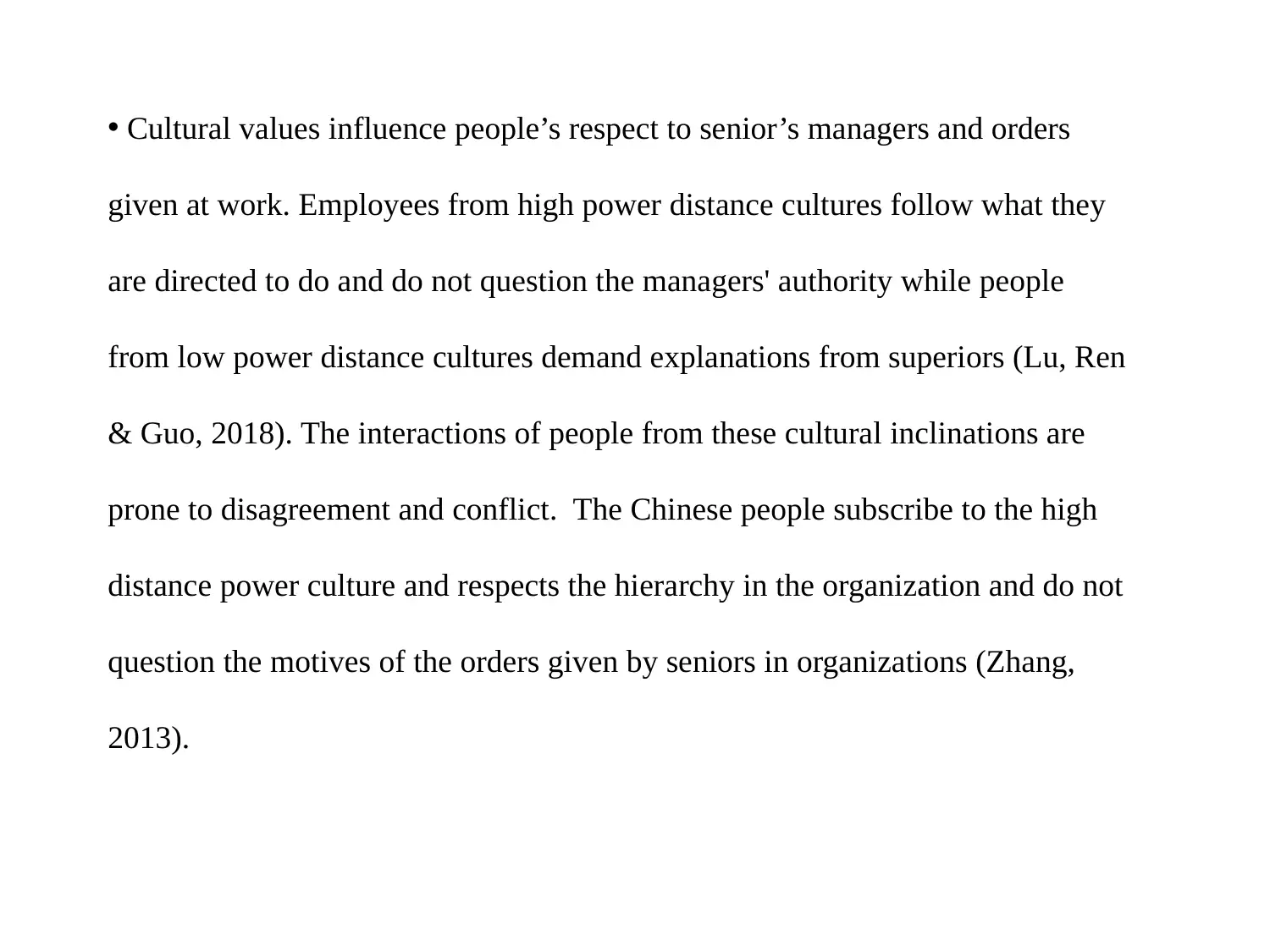
• Cultural values influence people’s respect to senior’s managers and orders
given at work. Employees from high power distance cultures follow what they
are directed to do and do not question the managers' authority while people
from low power distance cultures demand explanations from superiors (Lu, Ren
& Guo, 2018). The interactions of people from these cultural inclinations are
prone to disagreement and conflict. The Chinese people subscribe to the high
distance power culture and respects the hierarchy in the organization and do not
question the motives of the orders given by seniors in organizations (Zhang,
2013).
given at work. Employees from high power distance cultures follow what they
are directed to do and do not question the managers' authority while people
from low power distance cultures demand explanations from superiors (Lu, Ren
& Guo, 2018). The interactions of people from these cultural inclinations are
prone to disagreement and conflict. The Chinese people subscribe to the high
distance power culture and respects the hierarchy in the organization and do not
question the motives of the orders given by seniors in organizations (Zhang,
2013).
Secure Best Marks with AI Grader
Need help grading? Try our AI Grader for instant feedback on your assignments.
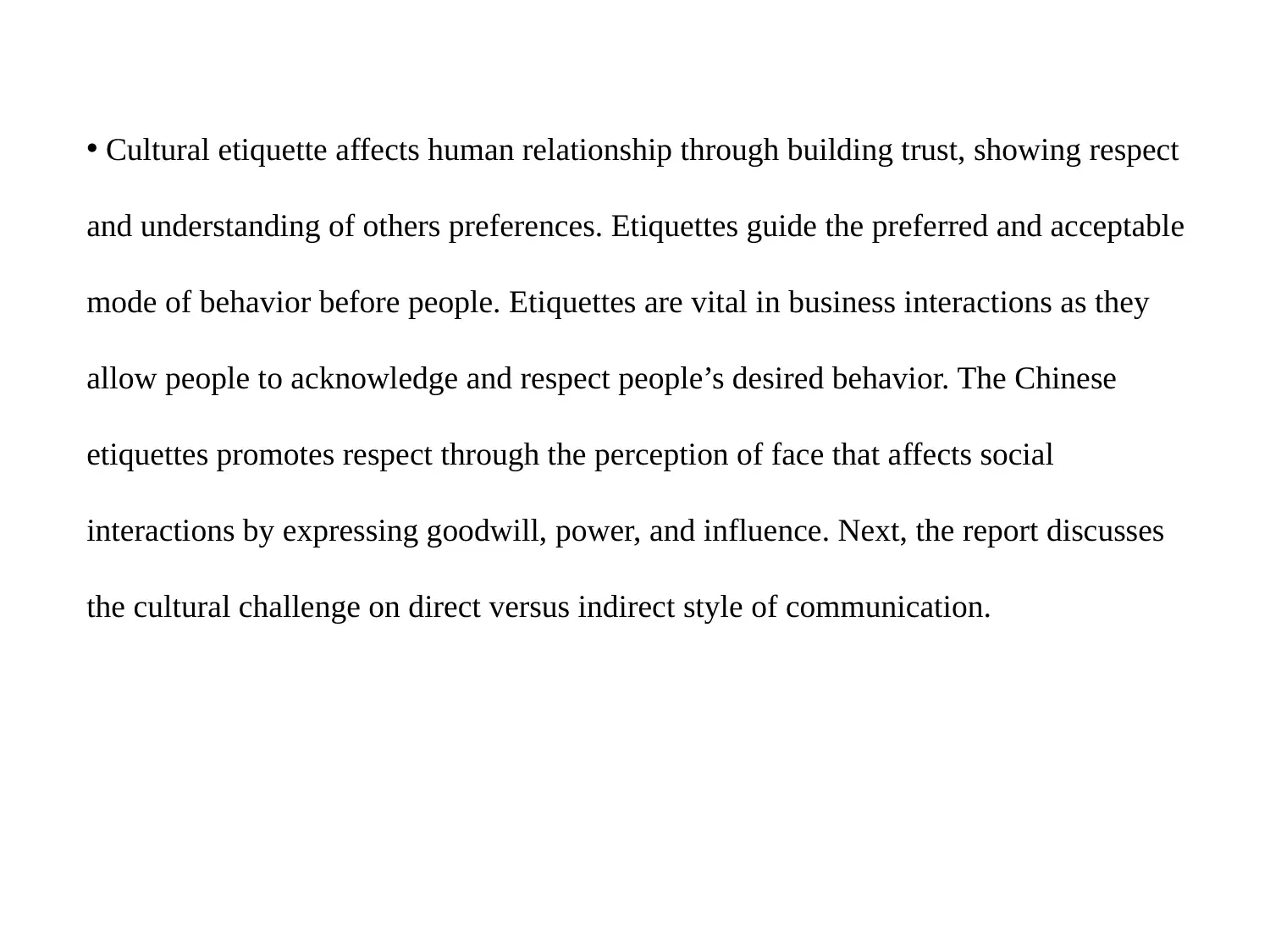
• Cultural etiquette affects human relationship through building trust, showing respect
and understanding of others preferences. Etiquettes guide the preferred and acceptable
mode of behavior before people. Etiquettes are vital in business interactions as they
allow people to acknowledge and respect people’s desired behavior. The Chinese
etiquettes promotes respect through the perception of face that affects social
interactions by expressing goodwill, power, and influence. Next, the report discusses
the cultural challenge on direct versus indirect style of communication.
and understanding of others preferences. Etiquettes guide the preferred and acceptable
mode of behavior before people. Etiquettes are vital in business interactions as they
allow people to acknowledge and respect people’s desired behavior. The Chinese
etiquettes promotes respect through the perception of face that affects social
interactions by expressing goodwill, power, and influence. Next, the report discusses
the cultural challenge on direct versus indirect style of communication.
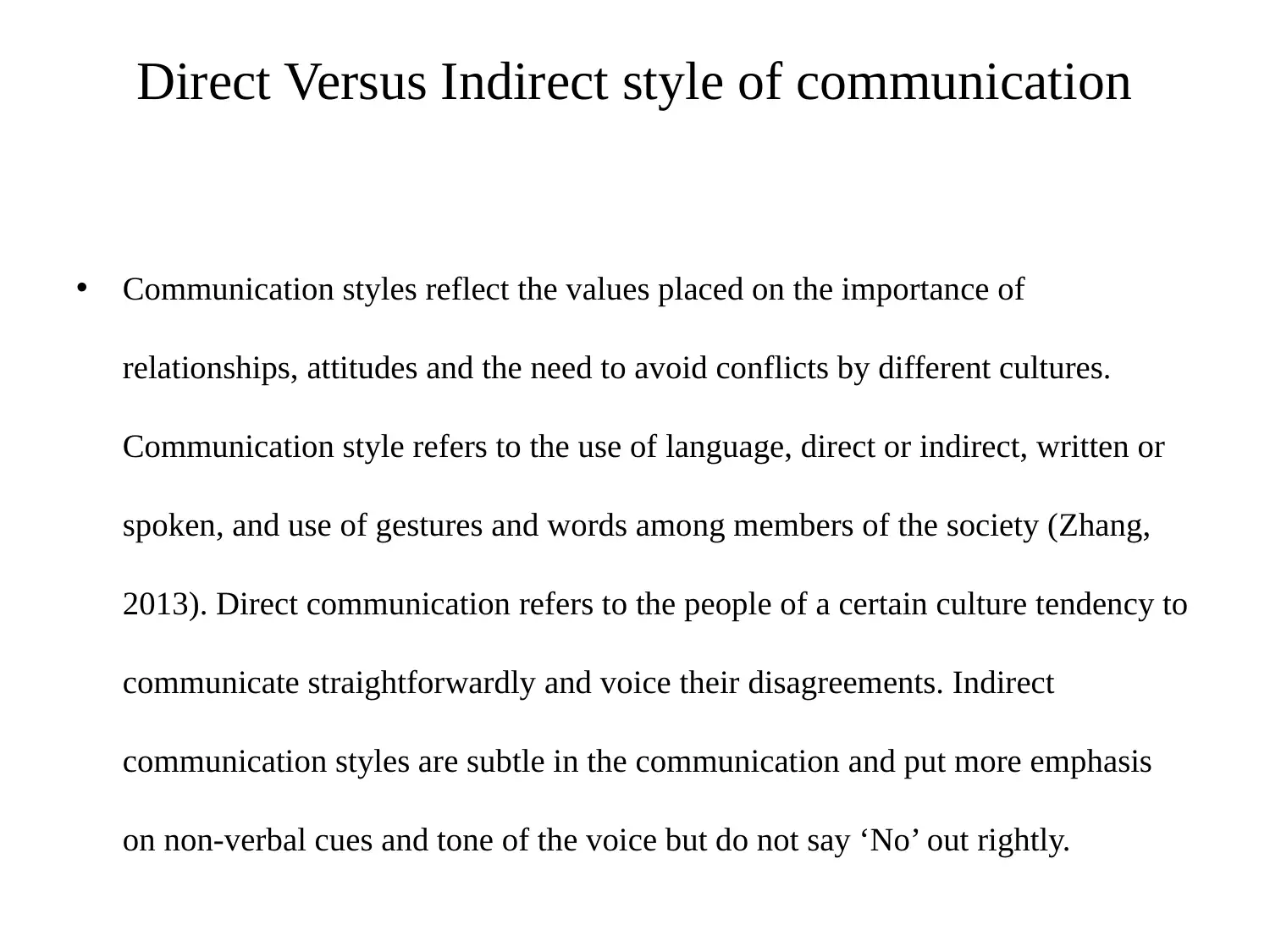
Direct Versus Indirect style of communication
• Communication styles reflect the values placed on the importance of
relationships, attitudes and the need to avoid conflicts by different cultures.
Communication style refers to the use of language, direct or indirect, written or
spoken, and use of gestures and words among members of the society (Zhang,
2013). Direct communication refers to the people of a certain culture tendency to
communicate straightforwardly and voice their disagreements. Indirect
communication styles are subtle in the communication and put more emphasis
on non-verbal cues and tone of the voice but do not say ‘No’ out rightly.
• Communication styles reflect the values placed on the importance of
relationships, attitudes and the need to avoid conflicts by different cultures.
Communication style refers to the use of language, direct or indirect, written or
spoken, and use of gestures and words among members of the society (Zhang,
2013). Direct communication refers to the people of a certain culture tendency to
communicate straightforwardly and voice their disagreements. Indirect
communication styles are subtle in the communication and put more emphasis
on non-verbal cues and tone of the voice but do not say ‘No’ out rightly.
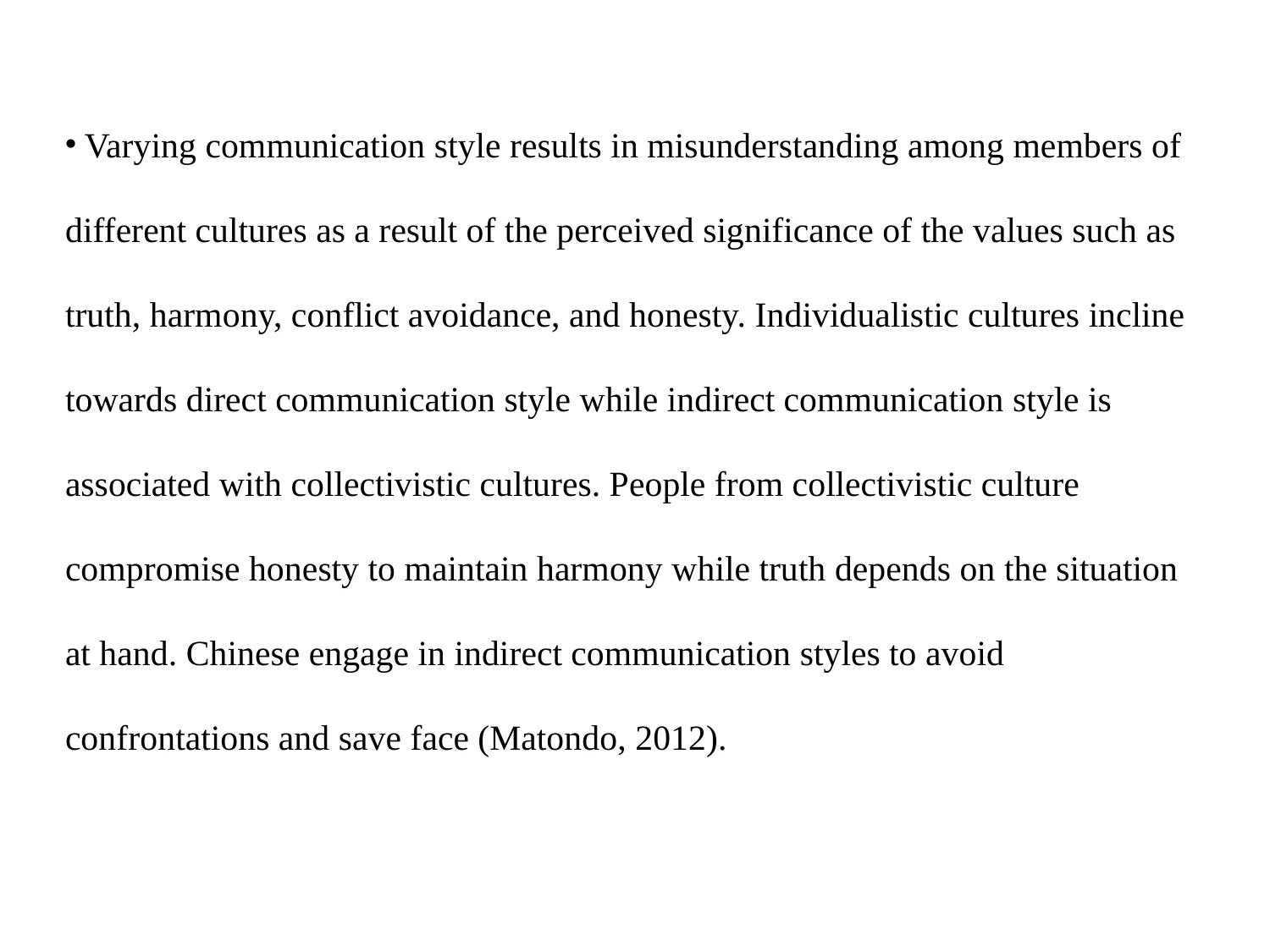
• Varying communication style results in misunderstanding among members of
different cultures as a result of the perceived significance of the values such as
truth, harmony, conflict avoidance, and honesty. Individualistic cultures incline
towards direct communication style while indirect communication style is
associated with collectivistic cultures. People from collectivistic culture
compromise honesty to maintain harmony while truth depends on the situation
at hand. Chinese engage in indirect communication styles to avoid
confrontations and save face (Matondo, 2012).
different cultures as a result of the perceived significance of the values such as
truth, harmony, conflict avoidance, and honesty. Individualistic cultures incline
towards direct communication style while indirect communication style is
associated with collectivistic cultures. People from collectivistic culture
compromise honesty to maintain harmony while truth depends on the situation
at hand. Chinese engage in indirect communication styles to avoid
confrontations and save face (Matondo, 2012).
Paraphrase This Document
Need a fresh take? Get an instant paraphrase of this document with our AI Paraphraser
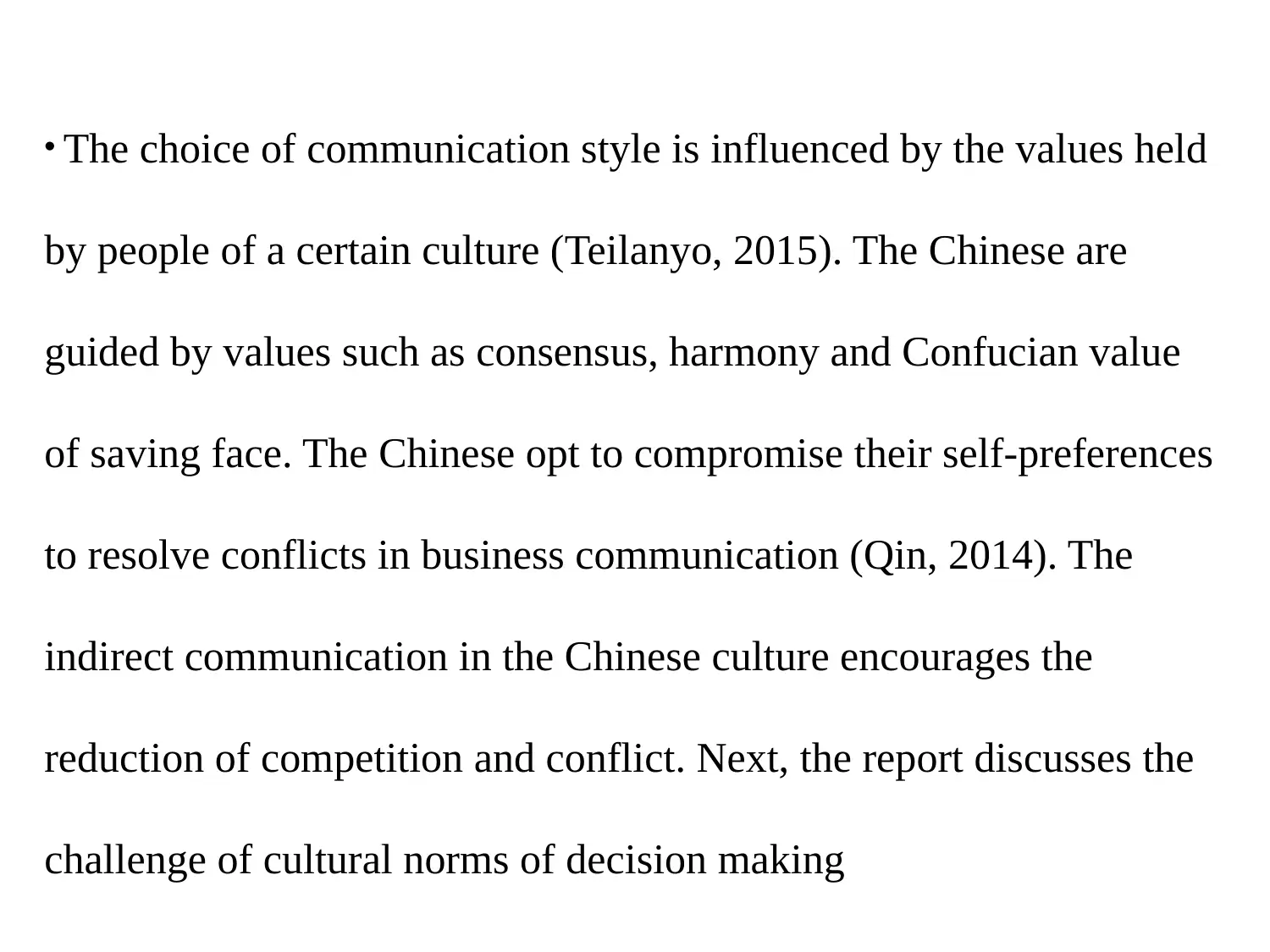
• The choice of communication style is influenced by the values held
by people of a certain culture (Teilanyo, 2015). The Chinese are
guided by values such as consensus, harmony and Confucian value
of saving face. The Chinese opt to compromise their self-preferences
to resolve conflicts in business communication (Qin, 2014). The
indirect communication in the Chinese culture encourages the
reduction of competition and conflict. Next, the report discusses the
challenge of cultural norms of decision making
by people of a certain culture (Teilanyo, 2015). The Chinese are
guided by values such as consensus, harmony and Confucian value
of saving face. The Chinese opt to compromise their self-preferences
to resolve conflicts in business communication (Qin, 2014). The
indirect communication in the Chinese culture encourages the
reduction of competition and conflict. Next, the report discusses the
challenge of cultural norms of decision making
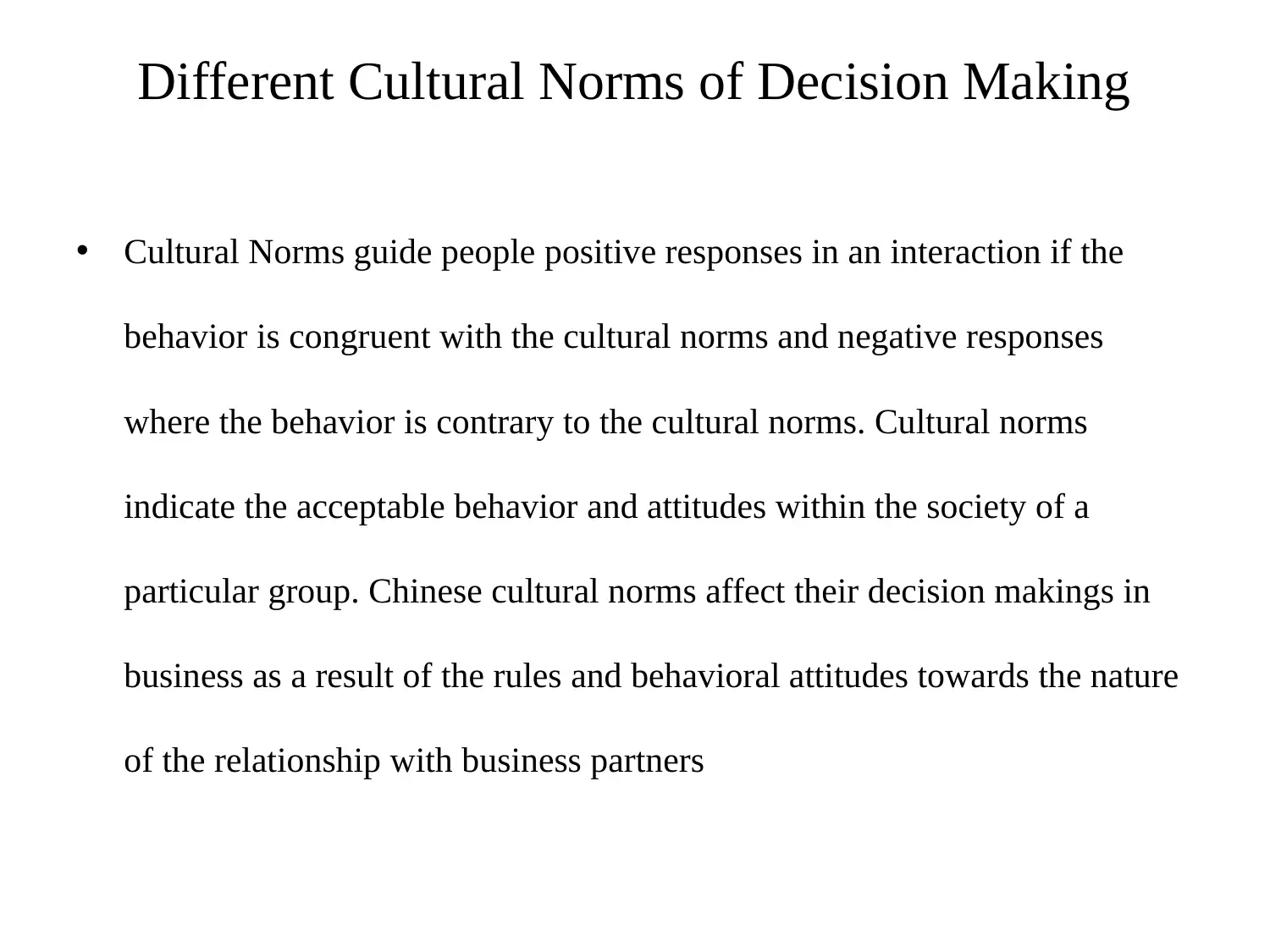
Different Cultural Norms of Decision Making
• Cultural Norms guide people positive responses in an interaction if the
behavior is congruent with the cultural norms and negative responses
where the behavior is contrary to the cultural norms. Cultural norms
indicate the acceptable behavior and attitudes within the society of a
particular group. Chinese cultural norms affect their decision makings in
business as a result of the rules and behavioral attitudes towards the nature
of the relationship with business partners
• Cultural Norms guide people positive responses in an interaction if the
behavior is congruent with the cultural norms and negative responses
where the behavior is contrary to the cultural norms. Cultural norms
indicate the acceptable behavior and attitudes within the society of a
particular group. Chinese cultural norms affect their decision makings in
business as a result of the rules and behavioral attitudes towards the nature
of the relationship with business partners
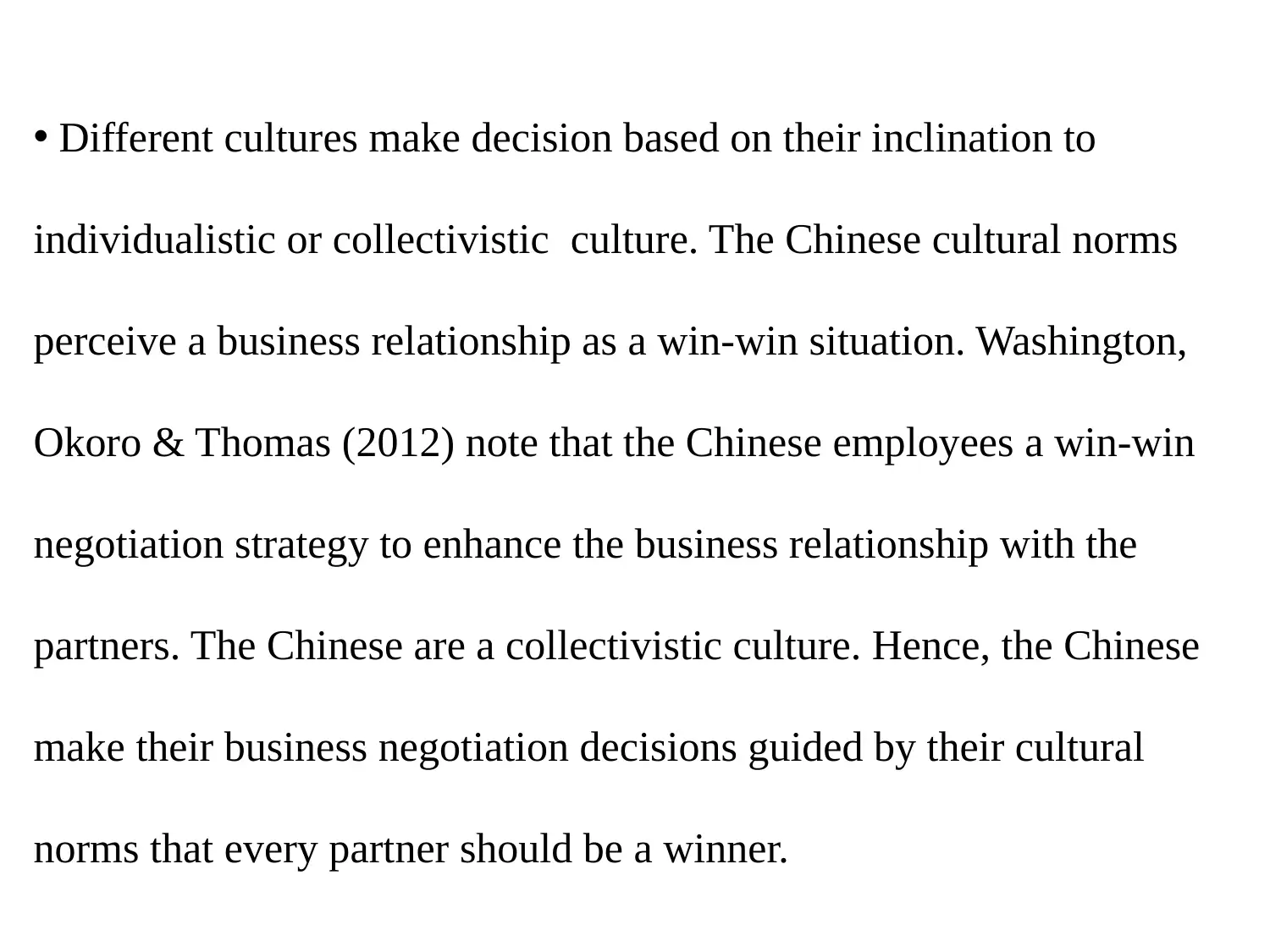
• Different cultures make decision based on their inclination to
individualistic or collectivistic culture. The Chinese cultural norms
perceive a business relationship as a win-win situation. Washington,
Okoro & Thomas (2012) note that the Chinese employees a win-win
negotiation strategy to enhance the business relationship with the
partners. The Chinese are a collectivistic culture. Hence, the Chinese
make their business negotiation decisions guided by their cultural
norms that every partner should be a winner.
individualistic or collectivistic culture. The Chinese cultural norms
perceive a business relationship as a win-win situation. Washington,
Okoro & Thomas (2012) note that the Chinese employees a win-win
negotiation strategy to enhance the business relationship with the
partners. The Chinese are a collectivistic culture. Hence, the Chinese
make their business negotiation decisions guided by their cultural
norms that every partner should be a winner.
Secure Best Marks with AI Grader
Need help grading? Try our AI Grader for instant feedback on your assignments.
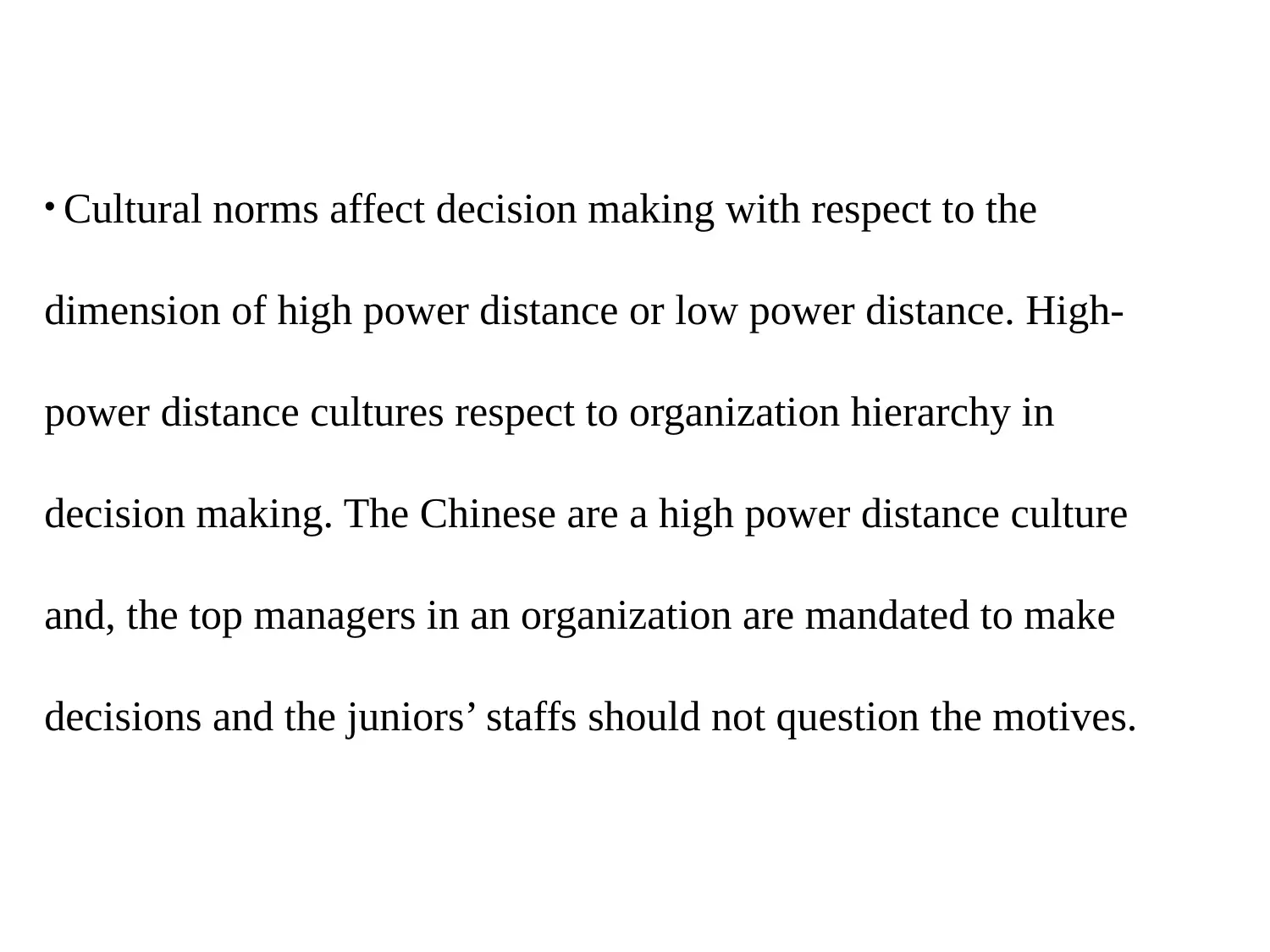
• Cultural norms affect decision making with respect to the
dimension of high power distance or low power distance. High-
power distance cultures respect to organization hierarchy in
decision making. The Chinese are a high power distance culture
and, the top managers in an organization are mandated to make
decisions and the juniors’ staffs should not question the motives.
dimension of high power distance or low power distance. High-
power distance cultures respect to organization hierarchy in
decision making. The Chinese are a high power distance culture
and, the top managers in an organization are mandated to make
decisions and the juniors’ staffs should not question the motives.
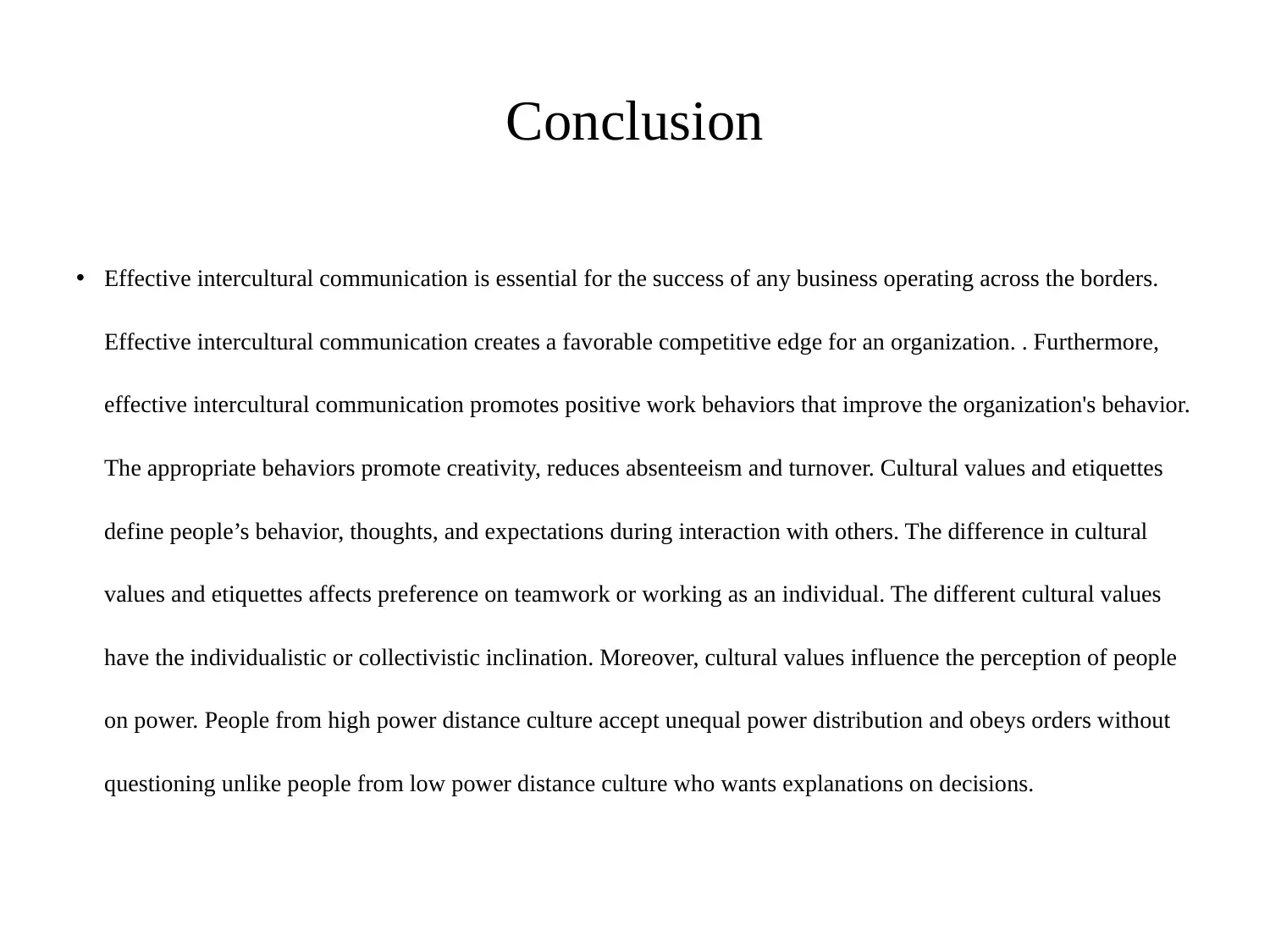
Conclusion
• Effective intercultural communication is essential for the success of any business operating across the borders.
Effective intercultural communication creates a favorable competitive edge for an organization. . Furthermore,
effective intercultural communication promotes positive work behaviors that improve the organization's behavior.
The appropriate behaviors promote creativity, reduces absenteeism and turnover. Cultural values and etiquettes
define people’s behavior, thoughts, and expectations during interaction with others. The difference in cultural
values and etiquettes affects preference on teamwork or working as an individual. The different cultural values
have the individualistic or collectivistic inclination. Moreover, cultural values influence the perception of people
on power. People from high power distance culture accept unequal power distribution and obeys orders without
questioning unlike people from low power distance culture who wants explanations on decisions.
• Effective intercultural communication is essential for the success of any business operating across the borders.
Effective intercultural communication creates a favorable competitive edge for an organization. . Furthermore,
effective intercultural communication promotes positive work behaviors that improve the organization's behavior.
The appropriate behaviors promote creativity, reduces absenteeism and turnover. Cultural values and etiquettes
define people’s behavior, thoughts, and expectations during interaction with others. The difference in cultural
values and etiquettes affects preference on teamwork or working as an individual. The different cultural values
have the individualistic or collectivistic inclination. Moreover, cultural values influence the perception of people
on power. People from high power distance culture accept unequal power distribution and obeys orders without
questioning unlike people from low power distance culture who wants explanations on decisions.
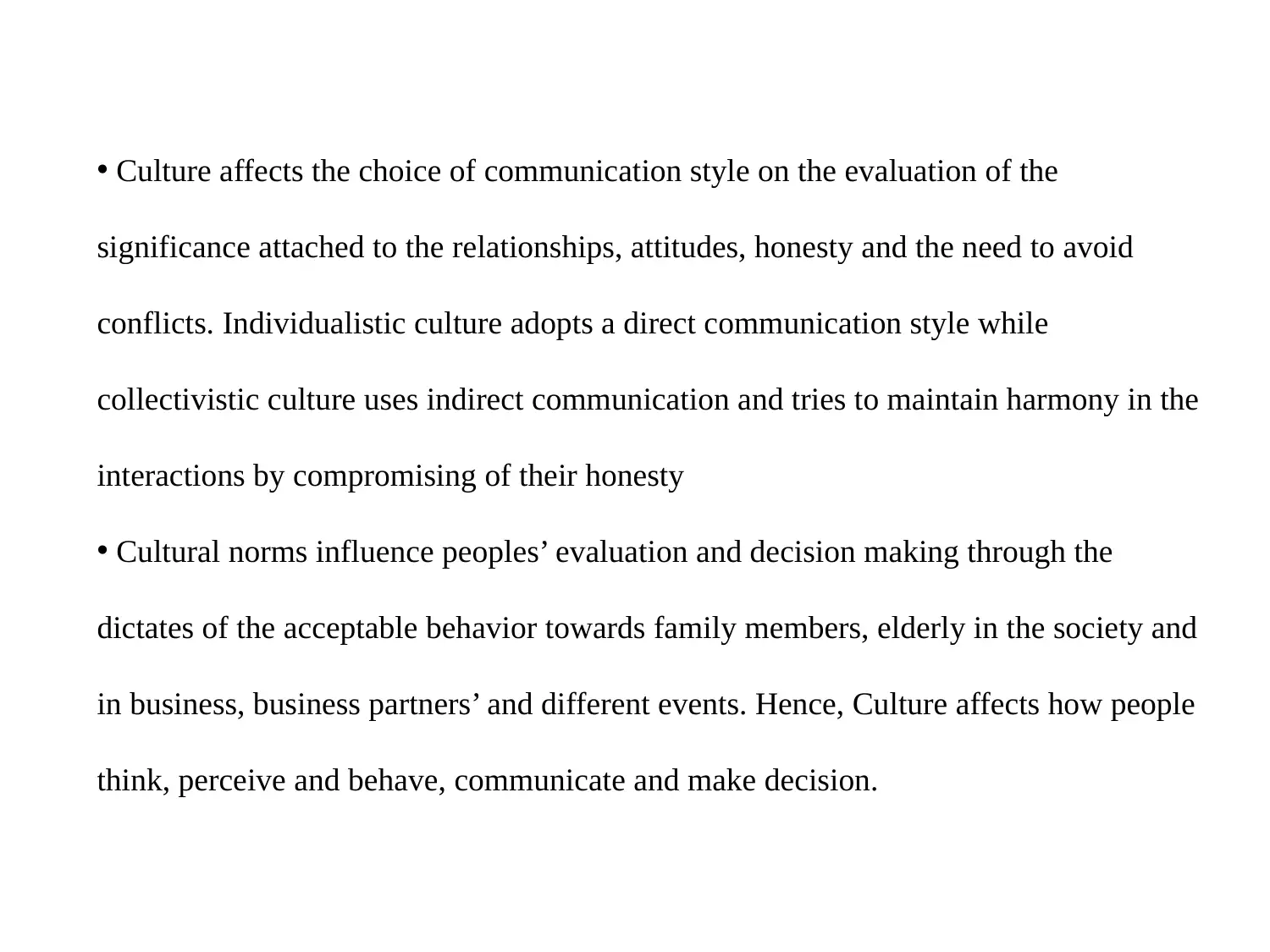
• Culture affects the choice of communication style on the evaluation of the
significance attached to the relationships, attitudes, honesty and the need to avoid
conflicts. Individualistic culture adopts a direct communication style while
collectivistic culture uses indirect communication and tries to maintain harmony in the
interactions by compromising of their honesty
• Cultural norms influence peoples’ evaluation and decision making through the
dictates of the acceptable behavior towards family members, elderly in the society and
in business, business partners’ and different events. Hence, Culture affects how people
think, perceive and behave, communicate and make decision.
significance attached to the relationships, attitudes, honesty and the need to avoid
conflicts. Individualistic culture adopts a direct communication style while
collectivistic culture uses indirect communication and tries to maintain harmony in the
interactions by compromising of their honesty
• Cultural norms influence peoples’ evaluation and decision making through the
dictates of the acceptable behavior towards family members, elderly in the society and
in business, business partners’ and different events. Hence, Culture affects how people
think, perceive and behave, communicate and make decision.
Paraphrase This Document
Need a fresh take? Get an instant paraphrase of this document with our AI Paraphraser
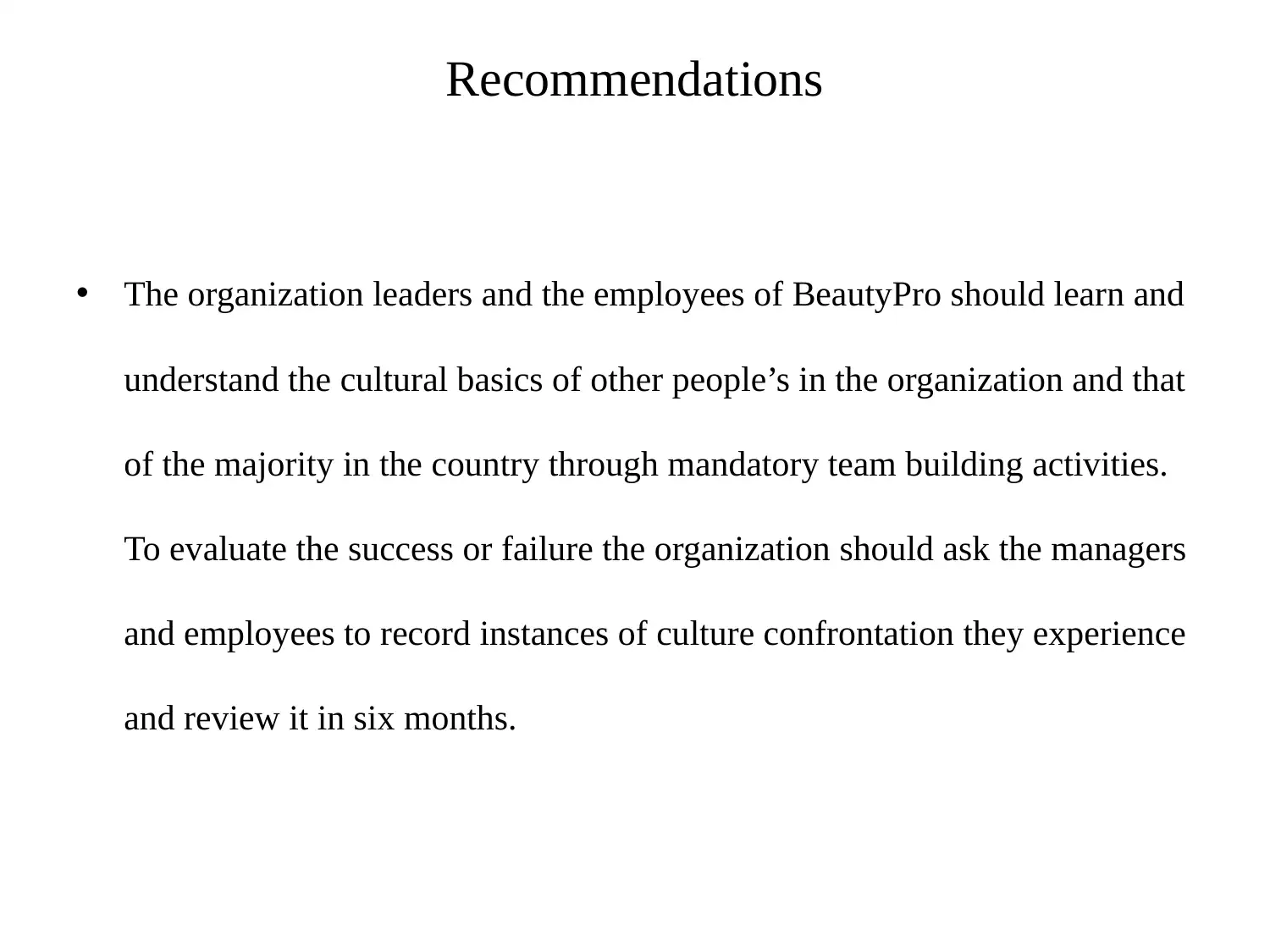
Recommendations
• The organization leaders and the employees of BeautyPro should learn and
understand the cultural basics of other people’s in the organization and that
of the majority in the country through mandatory team building activities.
To evaluate the success or failure the organization should ask the managers
and employees to record instances of culture confrontation they experience
and review it in six months.
• The organization leaders and the employees of BeautyPro should learn and
understand the cultural basics of other people’s in the organization and that
of the majority in the country through mandatory team building activities.
To evaluate the success or failure the organization should ask the managers
and employees to record instances of culture confrontation they experience
and review it in six months.
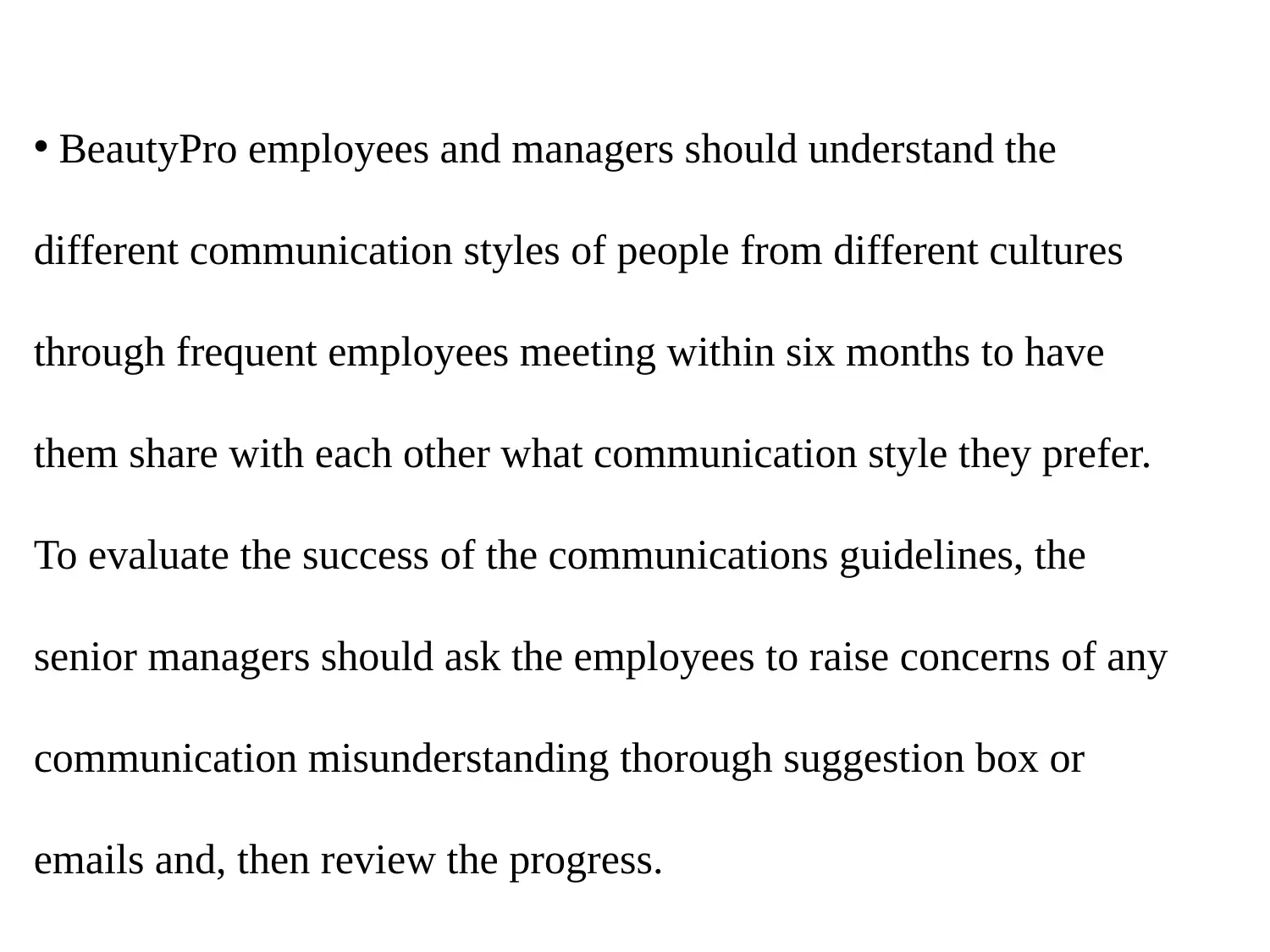
• BeautyPro employees and managers should understand the
different communication styles of people from different cultures
through frequent employees meeting within six months to have
them share with each other what communication style they prefer.
To evaluate the success of the communications guidelines, the
senior managers should ask the employees to raise concerns of any
communication misunderstanding thorough suggestion box or
emails and, then review the progress.
different communication styles of people from different cultures
through frequent employees meeting within six months to have
them share with each other what communication style they prefer.
To evaluate the success of the communications guidelines, the
senior managers should ask the employees to raise concerns of any
communication misunderstanding thorough suggestion box or
emails and, then review the progress.
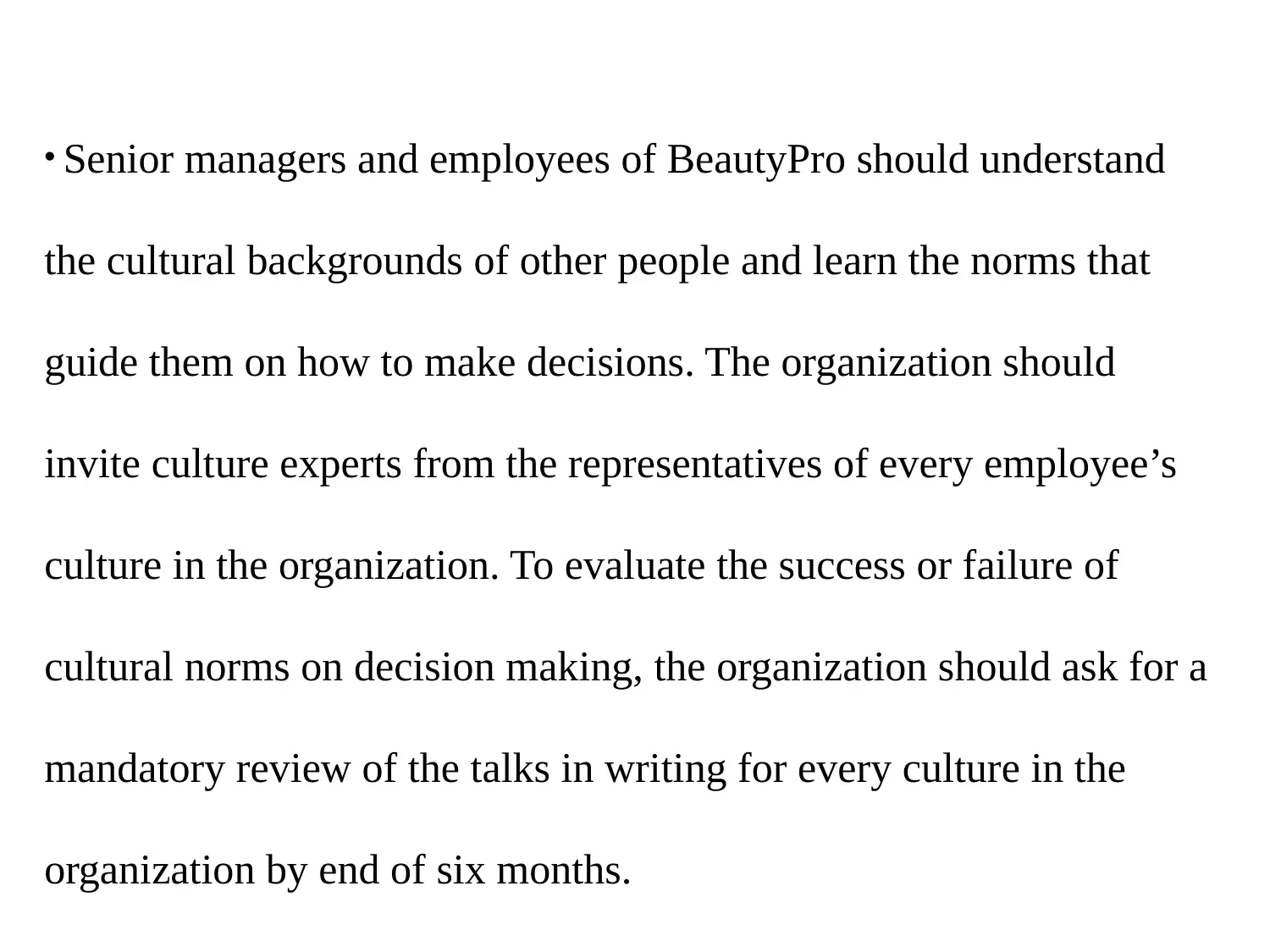
• Senior managers and employees of BeautyPro should understand
the cultural backgrounds of other people and learn the norms that
guide them on how to make decisions. The organization should
invite culture experts from the representatives of every employee’s
culture in the organization. To evaluate the success or failure of
cultural norms on decision making, the organization should ask for a
mandatory review of the talks in writing for every culture in the
organization by end of six months.
the cultural backgrounds of other people and learn the norms that
guide them on how to make decisions. The organization should
invite culture experts from the representatives of every employee’s
culture in the organization. To evaluate the success or failure of
cultural norms on decision making, the organization should ask for a
mandatory review of the talks in writing for every culture in the
organization by end of six months.
1 out of 16
![[object Object]](/_next/static/media/star-bottom.7253800d.svg)





